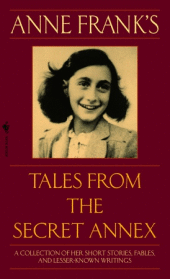 W
WChambers of rhetoric were dramatic societies in the Low Countries. Their members were called Rederijkers, from the French word 'rhétoricien', and during the 15th and 16th centuries were mainly interested in dramas and lyrics. These societies were closely connected with local civic leaders and their public plays were a form of early public relations for the city.
 W
WThe Diary of a Young Girl, also known as The Diary of Anne Frank, is a book of the writings from the Dutch-language diary kept by Anne Frank while she was in hiding for two years with her family during the Nazi occupation of the Netherlands. The family was apprehended in 1944, and Anne Frank died of typhus in the Bergen-Belsen concentration camp in 1945. The diary was retrieved by Miep Gies, who gave it to Anne's father, Otto Frank, the family's only known survivor, just after the Second World War was over. The diary has since been published in more than 70 languages. First published under the title Het Achterhuis. Dagboekbrieven 14 Juni 1942 – 1 Augustus 1944 by Contact Publishing in Amsterdam in 1947, the diary received widespread critical and popular attention on the appearance of its English language translation, Anne Frank: The Diary of a Young Girl by Doubleday & Company and Vallentine Mitchell in 1952. Its popularity inspired the 1955 play The Diary of Anne Frank by the screenwriters Frances Goodrich and Albert Hackett, which they adapted for the screen for the 1959 movie version. The book is included in several lists of the top books of the 20th century.
 W
WFolklore of the Low Countries, often just referred to as Dutch folklore, includes the epics, legends, fairy tales and oral traditions of the people of Belgium, Netherlands and Luxembourg. Traditionally this folklore is written or spoken in Dutch.
 W
W"Hebban olla vogala", sometimes spelled "hebban olla uogala", are the first three words of an 11th-century text fragment written in Old Dutch. The fragment, also known as the Rochester Poem, was discovered in 1932 on the flyleaf of a manuscript that was probably made in the abbey of Rochester, Kent, and is kept in Oxford. It is usually considered to represent a West Flemish variant of Old Low Franconian.
 W
WHeer Halewijn is a Dutch folk tale which survives in folk ballad. Although the first printed version of the song only appears in an anthology published in 1848, the ballad itself is first written down in the 13th century but dates back to pre-Christian times and is one of the oldest Dutch folk songs with ancient subject matter to be recorded. The story of lord Halewijn itself is even older and contains elements going back to Carolingian times. Many of its mythemes range back to Germanic pre-Christian legends.
 W
WEsther (Etty) Hillesum was the Dutch author of confessional letters and diaries which describe both her religious awakening and the persecutions of Jewish people in Amsterdam during the German occupation. In 1943 she was deported and killed in Auschwitz concentration camp.
 W
WJulius Excluded from Heaven is a dialogue that was written in 1514, commonly attributed to the Dutch humanist and theologian Desiderius Erasmus. It involves Pope Julius II, who had recently died, trying to persuade Saint Peter to allow him to enter Heaven by using the same tactics he applied when alive. The dialogue is also supplemented by a "Genius" who makes wry comments about the pope and his deeds.
 W
WThe Leiden Willeram or Egmond Willeram, is the name given to a manuscript containing an Old Dutch version of the Old High German commentary on Song of Solomon by the German abbot Williram of Ebersberg. The translation, since 1597 in the Leiden University Library, was done at the end of the 11th century by a monk of the Abbey of Egmond in the present day Netherlands. The literary text would be seen as the start of Dutch literature, were it not for the fact that the manuscript probably never left the abbey, so it couldn't have influenced later works.
 W
WSix Candles for Indonesia was a published fictional diary by Leonhard Huizinga.
 W
WThe Tachtigers ("Eightiers"), otherwise known as the Movement of Eighty, were a radical and influential group of Dutch writers who developed a new approach in 19th-century Dutch literature. They interacted and worked together in Amsterdam from the 1880s. Many of them are still widely read today.
 W
WTales from the Secret Annex is a collection of miscellaneous prose fiction and non-fiction written by Anne Frank while she was in hiding during the Nazi occupation of The Netherlands. It was first published in The Netherlands in 1949, then in an expanded edition in 1960. A complete edition appeared in 1982, and was later included in the 2003 publication of The Revised Critical Edition of The Diary of Anne Frank.